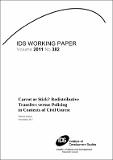| dc.contributor.author | Justino, Patricia | |
| dc.coverage.spatial | India | en_GB |
| dc.date.accessioned | 2014-07-30T15:52:11Z | |
| dc.date.available | 2014-07-30T15:52:11Z | |
| dc.date.issued | 2011 | |
| dc.identifier.citation | Justino, P. (2011) Carrot or stick? : redistributive transfers versus policing in contexts of civil unrest. Working paper series, 382. Brighton: IDS. | en_GB |
| dc.identifier.uri | https://opendocs.ids.ac.uk/opendocs/handle/20.500.12413/4239 | |
| dc.description.abstract | Recurrent episodes of civil unrest significantly reduce the potential for economic growth and
poverty reduction. Yet the economics literature offers little understanding of what triggers civil
unrest in society and how to prevent it. This paper provides a theoretical analysis in a
dynamic setting of the merits of redistributive transfers in preventing the onset of (and
reducing) civil unrest and compare it with policies of more direct intervention such as the use
of police. We present empirical evidence for a panel of Indian states, where conflict, transfers
and policing are treated as endogenous variables. Our empirical results show, in the
medium-term, redistributive transfers are both a more successful and cost-effective means to
reduce civil unrest. Policing is at best a short-term strategy. In the longer term, it may trigger
further social discontent.
Keywords: transfers; policing; conflict; unrest, India; panel data. | en_GB |
| dc.language.iso | en | en_GB |
| dc.publisher | IDS | en_GB |
| dc.relation.ispartofseries | IDS working papers;382 | |
| dc.rights.uri | http://www.ids.ac.uk/files/dmfile/IDSOpenDocsStandardTermsOfUse.pdf | en_GB |
| dc.subject | Finance | en_GB |
| dc.subject | Governance | en_GB |
| dc.subject | Security and Conflict | en_GB |
| dc.title | Carrot or stick? : redistributive transfers versus policing in contexts of civil unrest | en_GB |
| dc.type | IDS Working Paper | en_GB |
| dc.rights.holder | Institute of Development Studies | en_GB |

